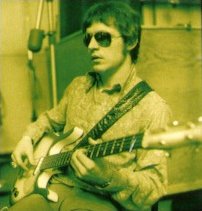

the trip
ArzachelNever heard of Arzachel? Neither had 3 of the 4 band members who made this one-shot record in 1967. The album was recorded in just one day, under the band's real name: "Uriel". Due to contractual issues between member Steve Hillage and his label, the recording was shelved, but released in 1969 using a name a band member made up off the top of his head. Very few records were pressed, and Arzachel became one of the most obscure - and valuable - records of its time. Thankfully, it has been re-released on CD. Hillage, you may recognize, later achieved some fame as a solo progressive guitarist, and you can really hear his tone developing here. Organist/analog synthesizer player Dave Stewart (not the one in the Eurythmics), vocalist/bassist Hugo Montgomery Campbell and Drummer Clive Brooks went on to form the seminal prog band Egg. The music? A totally original mix of renaissance-influenced lyrics, classical form and explosive psychedelic instrumentation, later mined by Emerson, Lake and Palmer and many other Prog-Rock bands. This, however, is the real deal. The Strawberry Alarm ClockThe Strawberry Alarm Clock is unfairly maligned as a "plastic" psychedelic band, but it's simply not true. They were a group of friends who put together their own band, and happened to become popular a bit too fast to know how to handle it. Their biggest hit was their first: "Incense and Peppermints". The vocalist on the cut wasn't really a member of the group, and afterwards went his own way, but the song became a touchstone to the swinging '60s. The other group members shared the lead vocal duties with varying results, and their harmonies are probably the best ever done by a '60s rock group. Unfortunately, the group definitely suffered from the lack of an identifiable front man. Their guitar work, however, cannot be faulted. Lead guitarist Ed King played a mean psychedelic riff (he later went on to play with Lynrd Skynrd for many years, and survived to tell about it). The tunes are really what SAC are all about, and theirs are some of the best pop-psych tunes ever recorded, even if little-known by the public. The first album has high moments with "Sit With the Guru", "Birds in my Tree" and "Tomorrow", which Chevrolet hired to use for their commercials for their new Camaro. They also contributed to a couple of cult films, including a fantastic intro scene in "Beyond the Valley of the Dolls" and the soundtrack for "Psych-Out". Unfortunately, at the height of their popularity, the band was busted on tour in Ohio for smoking pot. Their label, Chevrolet, and the other bands they were touring with dropped them cold, and that was the end for the group. More's the pity, as a year or two later, it all would've just blown over (consider the legendary drug excesses of bands like Led Zeppelin). Still, there's a few great songs they left for posterity and a bunch more of merely good ones. "Blues for a Young Girl Gone" and "Barefoot in Baltimore" are at least as good as anything Brian Wilson ever did. A footnote: there is an excellent tribute site to the SAC, and many of the original members log into in the chatroom most every night, answering questions and swapping stories about the old days. The United States of AmericaRunner-up for the contest for the lamest name for a band of the psychedelic era (see below), it wins the prize for some of the most complex and challenging music of its day. USA was created by Joseph Byrd who was, from all accounts, a very demanding and difficult fellow. The songs on their one album, recorded in 1968, are all over the place - with elements of psychedelic, hard rock, pop and avant garde, but are often fascinating and intense. Vocal duties were divided between Byrd and his (then) girlfriend Dorothy Moskiwitz, who has a great voice - a bit like the young Grace Slick. Songs Byrd sang tended to be bitter satires of American culture; her songs were usually more personal. She is particularly effective on "Love Song for the Dead Che", a haunting tribute to slain revolutionary Dr. Che Guevarra, as well as on the mind-twisting "Coming Down". Adding to their original sound was liberal use of the "ring modulator", a synthesizer/filter that produces some amazing sounds. USA was probably the most advanced thing going in American rock music in its day; pity it didn't continue to develop. The West Coast Pop Art Experimental BandSurely the clunkiest name ever for a rock band, the WCPAEB was the brainchild of one Bob Markley--an attorney and heir to an oilman's fortune. Markley really wanted to have a band--so much so that he hired a groups of talented musicians and relegated himself to playing tambourine in front of a dead microphone. More importantly, he wrote the lyrics for the songs that the band recorded over their 5-year lifespan. The lyrics were often dark and obscure, although there were some songs that were sweet and hopeful. Due to the lack of easy catagorization, internal strife and the awkward name, the WCPAEB never made more than a dent in the Southern California music scene of the late '60s. Their records, however are well-worth picking up. The first LP is largely covers of R&B tunes, but the second and third records are as progressive and daring as contemporary works by say, The Doors, even if they lack The Doors' melodic sense. Bob Markley, after a series of personal tragedies, is apparently confined to an institution in a semi-vegitative state. The other former members of the band have lately written some very uncomplimentary things about Markley, which seems to be unfair, not to mention in poor taste. The Chocolate WatchbandThe Chocolate Watchband is generally regarded as a psychedelic garage band, sort of a punkier Rolling Stones. Not all of their music fits that description. We confess that we don't much like singer Dave Aguilar's yelp - er - voice, which gave the band its signature sound. However, the producer of their records, the much loathed Mickey Most, put together some additional tracks to fill out the Watchband's "Inner Mystque" LP, and we like 'em better than the "real" Watchband's stuff! The cuts are "Voyage of the Trieste", "In the Past", and "Inner Mystique". All feature sitar, flute and electric guitar work, giving a haunting - almost exotic - sound. Not "real" Watchband? Who cares! You can keep your garage bands, we'll take the professional product every time. the cabaña the space station the lounge the cabaret the jazz club the conservatory the concert hall the screening room |